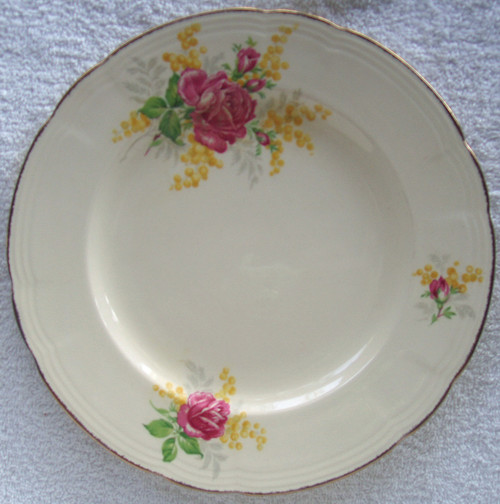Very art deco design from the 1930's - 1940's period
Featuring strong geometrical patterns in symmetry and the use of very bold, contrasting colours - a distinct contrast to the much more prevalent soft pale patterns principally featuring flowers (Roses or Spring flowers in particular)
This design jumps out at you, in fact it is screaming ... look at me, look at me!
DLAT Rating 9/10 (Darling, Look At This)
ALFRED MEAKIN - Side Plate
1930's ~ 1940's
This date of creation estimation is based upon the circular shaped backstamp WITHOUT the LTD after the pottery name, suggesting Post 1930 and this compliments the Art Deco design for the period.
Shape: Octagonal with four long sides and four short sides, which are in reality the corners cut across diagonally.
Dimensions: 152mm x 152mm x 10mm height
Weight: 150g
Opaque chinaware (if held to the light, you cannot see through the china)
Cream base colouring overall
Bold, strong colouring of a very symmetrical geometric design and a very small touch of flowers!
All artwork decoration is hand painted, truly to be admired as the artist was very skillful at their craft.
Heavy Gold gilding to the outer rim only
The backstamp (Green flowing writing in a circular pattern centred by a Crown graphic) is:
ALFRED MEAKIN
ENGLAND
Artist ID marks on the base of the side plate and these were used to identify who contributed to the production of each piece from the factory - the workers were paid on a "per piece completed" basis, not by the hour!
It can be quite an overpowering feeling that washes over a person holding this plate, to know that almost 100 years ago a lady (usually) held this plate in her hands and very carefully painted on the design. Oh sure, here and there are tiny little "woopsee" paint brush strokes in the artwork but that just adds to the charm of a plate decorated by a human hand and not a machine!
Hold one of these plates in your hand and you are taken back in time to another era ...
There is one more marking on the base of the side plate
Black print, different font to that used for the Alfred Meakin backstamp and very simply it is ...
FOYERS
We do not consider this to be the pattern name but in fact believe (but have not been able to find supporting information) this was part of a tea or dinner setting made for a specific customer.
The text FOYERS is under the glaze, so it was fired at the same time as the primary backstamp.
The only references we have ever found to a FOYERS in England is actually in Scotland, a hotel of long standing near Loch Ness but we seriously doubt this product was made exclusively for them or it was an extremely short production run!
We have this idea in the back of our minds that there once was a FOYERS department store in England, it could be that they made a special order with Alfred Meakin but we cannot find any proof of this and we also looked for information of any Australian major department stores called FOYERS - nothing could be found.
So the reason for, or who FOYERS was remains a mystery for us ...
COSMETIC CONDITION:
I have found two of these side plates which my wife no longer wishes to keep.
The condition report below refers to BOTH side plates equally, both are amazingly similar in condition, even down to the two fleabites on the underside.
NO damage to the artwork
NO cracks
NO discolouration or spotting
NO crazing observed (wet & dry tests) at all - this is quite amazing and shows that these plates have seen little use/cleaning and stored in a nice controlled environment. Lack of crazing is pretty unusual in such old chinaware.
Gold gilding also shows only the very slightest of handling wear, almost perfect and with no wear apparent.
A couple of very light "knife cuts" to the central area, so the plate has been used but only very occasionally. To see these marks you need to look extremely closely
On the underside I can see two fleabites (not discoloured) with no other flaws apparent.
Primary backstamp, the Black "add on" text and the artist/guildings marks are clearly visible














